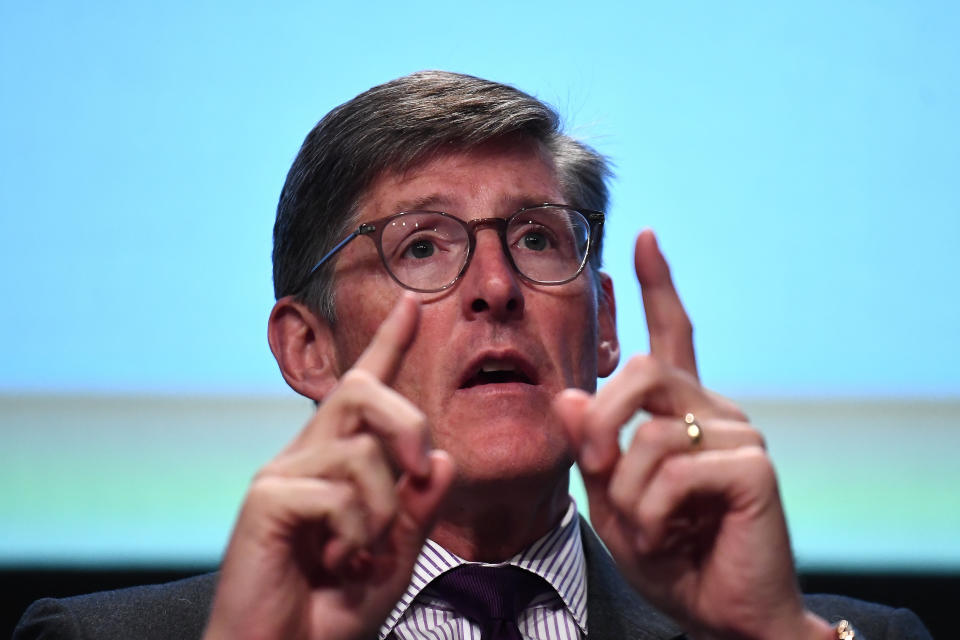Citigroup fine 'another black mark,' analyst says — but it's not 'life threatening'
Citigroup (C) will likely face significant costs as it tries to prove to regulators that it can correct its long-standing issues with risk management, including efforts to police potential money laundering.
The mega-bank has already committed to investing over $1 billion in fixing its problems and will pay a $400 million civil money penalty to the Office of the Comptroller of the Currency.
KBW bank analyst Brian Kleinhanzl wrote Thursday that “incremental investment may be required” beyond those costs. And veteran bank watcher Mike Mayo, a senior analyst at Wells Fargo Securities, agrees that the issue will likely require additional spending but said it doesn’t imperil the bank’s existence.
“This is not life threatening,” Mayo told Yahoo Finance’s On the Move on Thursday, adding that the regulatory issues could push the bank to make other incremental improvements to the bank’s business model.
Still, he said, “This is another black mark at a company that’s been the worst performing large U.S. bank for the last 20 years, or 100 years, however you want to describe it.”
‘The ultimate catalyst’ for Citigroup
On Thursday, the Federal Reserve officially announced a consent order against Citigroup, alleging the bank had “significant ongoing deficiencies” regarding its risk management and internal controls. The order details issues with its handling of data and its practices on regulatory reporting, including unresolved problems with its anti-money laundering compliance practices.
Per the order, Citigroup will have 120 days to prove to regulators that it can correct the problems.
The OCC, which imposed the fine on Citigroup, issued its own cease and desist requiring the bank to check in with the regulator before launching any potential mergers and acquisitions.

Rumors around the regulatory orders surfaced in mid-September, shortly after the bank announced that CEO Michael Corbat would be retiring and replaced by consumer banking head Jane Fraser. The Wall Street Journal later reported that the coming actions from the Fed and OCC were factors in accelerating Corbat’s exit, which will take place in February.
Mayo said he would like to see Fraser, who would become the first woman to head any of the big four U.S. banks, take the reins right away. Mayo added that he hopes her background at consulting firm McKinsey will spur dramatic firm-wide restructuring.
“This regulatory order could be the ultimate catalyst to finally get Citigroup to do a lot of the things that I personally have been saying for the last decade,” Mayo said, specifically calling for a divestment of its non-U.S. consumer businesses.
He added that he still has a buy rating on the stock, hinting at the upside for the company now that the company has hit “rock bottom” with these regulatory issues.
The regulatory news comes a week before the bank is set to announce its third quarter earnings, scheduled for Oct. 13.
Brian Cheung is a reporter covering the Fed, economics, and banking for Yahoo Finance. You can follow him on Twitter @bcheungz.
Less-educated Asian Americans among hardest hit by job losses during pandemic
Kansas City Fed Chief: No current plans for central bank to adopt digital currencies
Powell warns of 'weak recovery' if policymakers provide 'too little' COVID-19 relief
Fed still faces questions on how high, how long it will let inflation rise
A glossary of the Federal Reserve's full arsenal of 'bazookas'
Read the latest financial and business news from Yahoo Finance
Follow Yahoo Finance on Twitter, Facebook, Instagram, Flipboard, SmartNews, LinkedIn, YouTube, and reddit.
